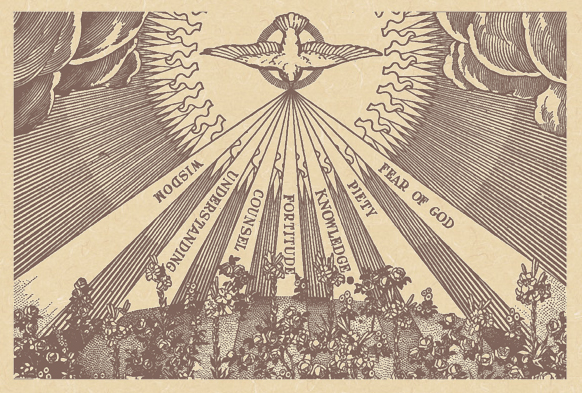"Law and Order" Theology.
The Sixth Sunday of Easter.
Lessons from the primary dominica, according to the ordinary form of the Roman Rite:
• Acts 8: 5-8, 14-17.
• Psalm 66: 3-7, 16, 20.
• I Peter 3: 15-18.
• John 14: 15-21.
The Fifth Sunday after Easter.
Lessons from the dominica, according to the extraordinary form of the Roman Rite:
• James 1: 22-27.
• [The Gradual is omitted.]
• John 16: 23-30.
The Sunday of the Man Born Blind; and, the Feast of the Holy Emperor Constantine & His Mother, Helen, Equals to the Apostles.
First & third lessons from the pentecostarion, second & fourth from the menaion, according to the Ruthenian recension of the Byzantine Rite:
• Acts 16: 16-34.
• Acts 26: 1-5, 12-20.
• John 9: 1-38.
• John 9: 39—10: 9.
FatherVenditti.com
|
 8:28 AM 5/21/2017 — I would like to begin today by reminding you that this Thursday is Ascension Thursday, and in the five dioceses of the state of New Jersey, Ascension Thursday is still observed on Ascension Thursday, because we are so incorrigibly so old fashioned here. I mention that for the benefit of those who may be visiting us today from out of state, since most dioceses in the United States transfer the Feast of the Ascension to next Sunday, and I don’t want you to miss observing such an important Holy Day. 8:28 AM 5/21/2017 — I would like to begin today by reminding you that this Thursday is Ascension Thursday, and in the five dioceses of the state of New Jersey, Ascension Thursday is still observed on Ascension Thursday, because we are so incorrigibly so old fashioned here. I mention that for the benefit of those who may be visiting us today from out of state, since most dioceses in the United States transfer the Feast of the Ascension to next Sunday, and I don’t want you to miss observing such an important Holy Day.
We are little more than two thirds through the Easter Season, Pentecost Sunday being on June the fourth this year, and in all the Scripture lessons of today’s Mass we are reminded of the gift of the Holy Spirit. In today’s first lesson from Acts, Philip penetrates into Samaria and baptizes many who had been inspired by his preaching to accept Christ, but he baptizes them only the name of Jesus, so his baptism is not complete. Some of you may remember the baptisms of your own children: the priest doing the baptism pours water over the head of the child—or, in some parishes, may actually immerse the child in water—and baptizes the child in the name of the Father, and of the Son, and of the Holy Spirit, but the baptism doesn’t end with that; he also lays his hands on the child, invoking the Holy Spirit, and anoints the child with blessed oil. These things were missing from the baptisms that Philip performed. So, Peter and John race to Samaria and provide these additional necessary elements. Notice—and this is important—that Peter and John do not re-baptized the Samaritans, because the baptism Philip provided was legitimate; it was simply incomplete, and Peter and John did nothing more than supply the invocation of the Holy Spirit that was left out of the ritual done my Philip. And this should be noticed by those who continue to maintain, as many charismatics do, that there is some sort of baptism of the Holy Spirit that stands apart from the Sacrament of Baptism. There isn’t. There is only one baptism, comprised of two parts: a cleansing of Original Sin by the pouring of water, and the invocation of the Holy Spirit, both of which are necessary.
The next lesson of today’s Mass, from Saint Peter’s first Epistle, also speaks of the Holy Spirit. His main theme in this letter is how the Christian needs to be prepared for persecution, and how it is the lot of every Christian soul to suffer for having made the decision to follow our Blessed Lord. He gives us a very difficult instruction: To treat with gentleness and kindness those who question and challenge our faith. He says we must do this so that our consciences can remain clear. I like the way Msgr. Knox puts it in his excellent translation: “What matters is that you should have a clear conscience; so the defamers of your holy life in Christ will be disappointed in their calumny” (I Peter 3: 16 Knox). But the passage ends with an invocation to the Holy Spirit that Christ promised to send: “In his mortal nature he was done to death, but endowed with fresh life in his spirit… (3: 18 Knox).
The Gospel lesson today is very explicitly all about the Holy Spirit; it’s pretty much all our Blessed Lord talks about in this passage from John’s Gospel. The Roman Missal translates our Lord as promising to send an “advocate.” Msgr. Knox translates it in a more casual way: “I will ask the Father, and he will give you another to befriend you… (John 14: 16 Knox). The actual word that Saint John uses in Greek is παράκλητον, often translated in English bibles as the word Paraclete, which, oddly enough, is a legal term taken from ancient Greek civil law. Technically, if refers to a defense attorney. In ancient Greece, when you were accused of a crime, you would hire yourself a παράκλητον, a lawyer to defend you, who would then plead your innocence before the judge, in much the same way that happens today in our own criminal courts. And this is clearly how our Blessed Lord wants us to view the Holy Spirit.  We are born into this world in a state of sin, separated from God’s grace; we have that sanctifying grace restored to us and our Original Sin washed away by baptism;—which includes, as we noticed before, an invocation of the Holy Spirit—but, the effects of that Original Sin remain with us, so that we remain vulnerable to temptation throughout our lives on earth and often fall into subsequent sins over and over again throughout our pilgrimage on earth. We have the confessional—yes. We have our Blessed Lord Himself in the Blessed Eucharist—yes. But when we finally come to stand before the throne of God’s justice, and our sins and our virtues are thrown into the scale, with a very good possibility of us coming up short, we’re going to need a very good lawyer. We are born into this world in a state of sin, separated from God’s grace; we have that sanctifying grace restored to us and our Original Sin washed away by baptism;—which includes, as we noticed before, an invocation of the Holy Spirit—but, the effects of that Original Sin remain with us, so that we remain vulnerable to temptation throughout our lives on earth and often fall into subsequent sins over and over again throughout our pilgrimage on earth. We have the confessional—yes. We have our Blessed Lord Himself in the Blessed Eucharist—yes. But when we finally come to stand before the throne of God’s justice, and our sins and our virtues are thrown into the scale, with a very good possibility of us coming up short, we’re going to need a very good lawyer.
But look at how good our Lord is! Even when we first enter this world—even at our very baptism into the faith—He puts the best lawyer in the world on retainer for us. The Holy Spirit is invoked in our behalf at our baptism, He is ratified as our advocate at our confirmation, and He remains at our side all throughout our lives, offering His help, His inspiration, His mercy and forgiveness. But, the relationship between our Advocate and ourselves is not a passive one. I don’t know how many of you are “Law and Order” junkies. I know I am. I think I must have every episode of “Law and Order” committed to memory. And if you’ve watched as many episodes of “Law and Order” as I have, you will have noticed that, every once in a while, there will be a case in which the competence of the defendant to stand trial is questioned. The bellwether seems to be whether the defendant is able to assist in his own defense. And the exact same thing is true in our relationship to the Holy Spirit sent to us by our Lord to be our Advocate: We have to be able and willing to do our part.
And what is our part? Well, our Blessed Lord says that pretty clearly: “The man who loves me is the man who keeps the commandments he has from me…” (John 14: 21 Knox). It’s as simple as that. Not that our Lord expects us to never break the Commandments at any time in our lives, otherwise He wouldn’t have established the sacrament of Penance and given us the great gift of the confessional; but, the Judge, at the very least, needs to see that we’re at least making the effort, doing our best to keep the Commandments, and having recourse to the sacraments when we fail. Regard well the words of the Act of Contrition we pray and at the end of every confession: “I firmly resolve, with the help of Thy Grace, to sin no more and avoid the near occasion of sin.” We’re not promising God that we will never sin again;—no reasonable person could promise that—we’re promising Him only that we will do our best. That we will examine our consciences regularly, and confess our sins frequently.
And if we do that faithfully throughout our lives, then the Holy Spirit will always remain with us, and we can be confident that He will not fail us on the day we stand before the throne of God’s mercy.

|

